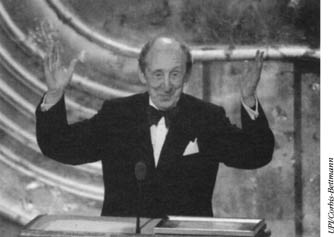
Pianist Vladimir Horowitz acknowledges applause after being honoured at the 1988 Grammy Awards ceremony.
Vladimir Horowitz, through a combination of iconoclastic technique, emotional expressiveness, and sheer physical stamina, became one of the pre-eminent pianists of the 20th century. He was renowned for his interpretations of RACHMANINOV, SCRIABIN, Liszt, and PROKOFIEV, as well as his intense renditions of Chopin, Scarlatti, and Schumann.
Horowitz was born Vladimir Horowitz on October 1, 1903, in Berdichev, Ukraine. The youngest son of a prosperous family, he began playing the piano at home at the age of three and entered Kiev Conservatory at 12. Although he displayed promise in composition in his early years, the 1917 Bolshevik Revolution and his family’s subsequent destitution forced Horowitz onto the concert stage.
During the 1922–23 season, existence was a struggle for Horowitz. He had to perform 15 times in Kharkov just for food and clothing, after which he undertook a marathon 70-concert tour of Russia, performing as many as 200 different works. His major break came on January 12, 1928, when he made an electrifying U.S. debut, playing Tchaikovsky’s Piano Concerto No. 1 under the baton of Sir Thomas BEECHAM. In 1933, Horowitz took part in a Beethoven cycle under the eminent conductor Arturo TOSCANINI, whose daughter, Wanda, was to become his wife.
Despite his fame as a pianist, Horowitz suffered from severe stage nerves, which made the strain of conceit life nearly unbearable. In 1936, he began the first of four prolonged periods of absence from the concert stage during his seven-decade-long career. However, these “retirements” (1935–38, 1953–65, 1969–72, 1983–85) served only to whet his public’s appetite. Three years after settling in America, Horowitz was awarded U.S. citizenship and appeared with Toscanini in many war-bond concerts. He maintained an active performing career until 1953, when he celebrated the 25th anniversary of his American debut with a concert at Carnegie Hall. For the next 12 years, however, he maintained a public silence. When Horowitz relented to give a return concert on May 9, 1965, public adulation reached the level of hysteria.

Pianist Vladimir Horowitz acknowledges applause after being honoured at the 1988 Grammy Awards ceremony.
Returning to Europe for the first time in 31 years, Horowitz gave a recital in London on May 22, 1982. Four years later, after another brief retirement, Horowitz gave a series of immensely popular concerts in Russia. It had been 60 years since his last concert there, and at the age of 82 he displayed undiminished technical and emotive powers.
Horowitz’s incandescent virtuoso approach will be remembered far longer than criticisms of shallow musicianship. As Horowitz noted, “I am a 19th-century Romantic. I am the last.” He played on the edge of controlled intensity and neurotic eccentricity, displaying sheer raw power, unaffected simplicity, and luminous quality of tone. Horowitz died on November 5, 1989 at his home in New York City.
Hao Huang
SEE ALSO:
PROKOFIEV, SERGEY; RUBINSTEIN, ARTUR.
Plaskin, Glenn. Horowitz: A Biography of Vladimir Horowitz (London: Macdonald, 1983);
Schoenberg, Harold C. Horowitz: His Life and Music (New York: Simon & Schuster, 1992).
Horowitz in Moscow; Horowitz Plays Sonatas by Prokofiev, Barber, and Kabelevsky, Rachmaninov: Concerto No. 3; Tchaikovsky: Concerto No. 1.